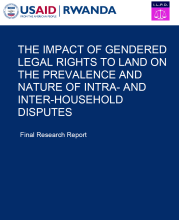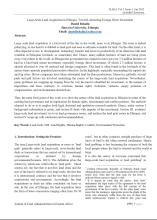Land Library
Welcome to the Land Portal Library. Explore our vast collection of open-access resources (over 74,000) including reports, journal articles, research papers, peer-reviewed publications, legal documents, videos and much more.
/ library resources
Showing items 1 through 9 of 21.Between October 2014 and October 2015, Radio Ishingiro with the support of USAID
Land Project implemented a Communications Campaign focused on influencing the
attitudes and mindsets of men and boys about gender-equal land rights to overcome
This research, entitled "The Impact of Gendered Legal Rights to Land on the Prevalence and Nature of Intra- and Inter-Household Disputes" set out to interrogate the changing landscape of gendered land rights in Rwanda, and to examine the impact of the statutory changes introduced by laws governin
Before 1999, land rights in Rwanda were governed by three regimes: customary
(traditional) law, colonial laws still in effect, and laws enacted after independence. In each of
these, men were privileged in ownership and control of land whereas women were excluded
In Africa, land has an emotional and mystical value beyond the economic consideration and
represents the social security and the continuity and independence of a family. In much of rural
Africa, land constitutes the primary source from which millions of people derive their daily
In various countries around the world, land expropriation is considered as a major tool used by governments to assemble tracts of land for various activities aiming at public interest.
Large scale land acquisition is a buzzword of the day in the world, more so in Ethiopia. The issue is indeed polarizing, in one hand it is dubbed as land grab and seen as ultimate scramble for land.
Objections to assessed compensation for expropriated land in Tanzania have been on increase irrespective of the changed ideologies of the country.
— International Valuation Standards and best practice advocates consistency, objectivity, independence and transparency as critical in ensuring credible valuations and in building public trust and confidence in valuation.
To say that access to land is one of the most important conditions for the
empowerment of African women, would be an understatement. The cultivation of land is one
of the main sources of income and economic wealth depends strongly on a well-elaborated









